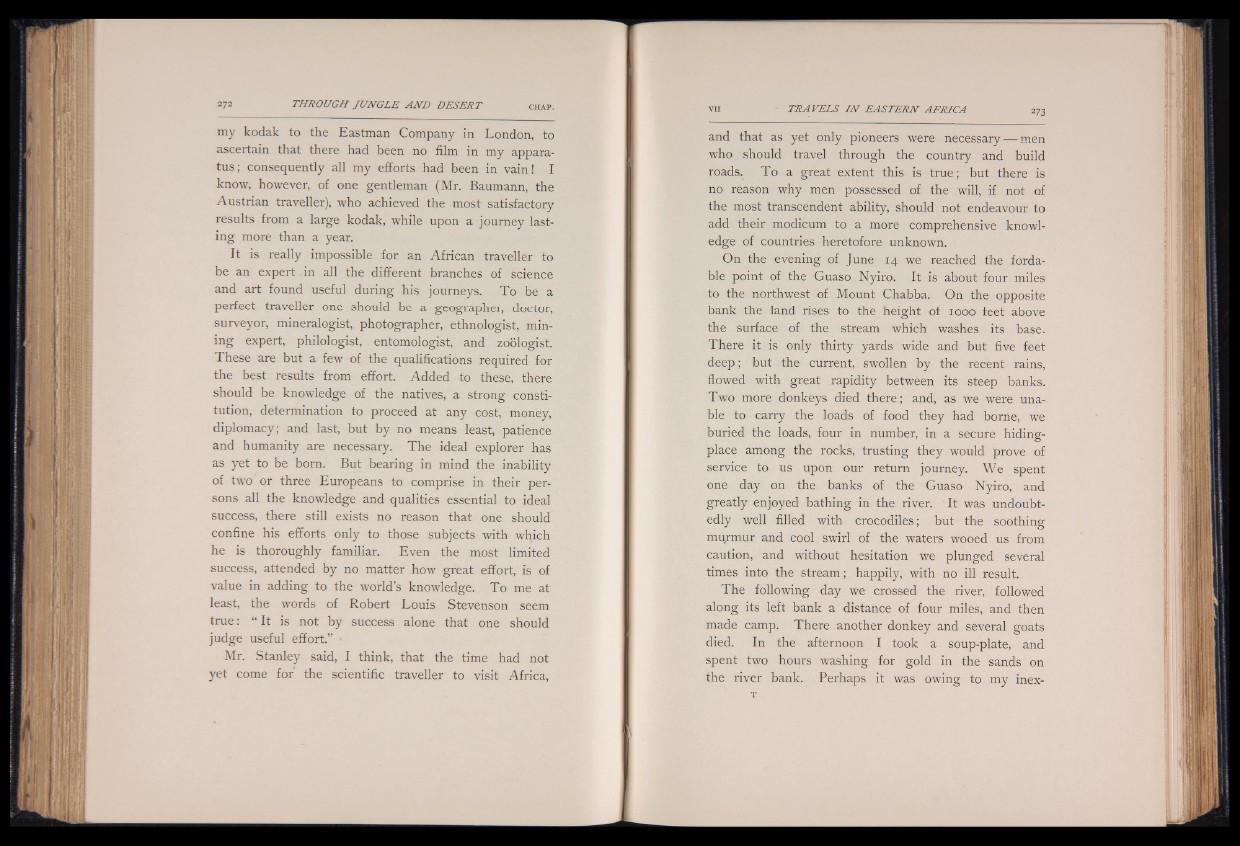
my kodak to the Eastman Company in London, to
ascertain that there had been no film in my apparatus
; consequently all my efforts had been in vain! I
know, however, of one gentleman (Mr. Baumann, the
Austrian traveller), who achieved the most satisfactory
results from a large kodak, while upon a journey lasting
more than a year.
It is really impossible for an African traveller to
be an expert in all the different branches of science
and art found useful during his journeys. To be a
perfect traveller one should be a geographer, doctor,
surveyor, mineralogist, photographer, ethnologist, mining
expert, philologist, entomologist, and zoologist.
These are but a few of the qualifications required for
the best results from effort. Added to these, there
should be knowledge of the natives, a strong constitution,
determination to proceed at any cost, money,
diplomacy; and last, but by no means least, patience
and humanity are necessary. The ideal explorer has
as yet to be bom. But bearing in mind the inability
of two or three Europeans to comprise in their persons
all the knowledge and qualities essential to ideal
success, there still exists no reason that one should
confine his efforts only to those subjects with which
he is thoroughly familiar. Even the most limited
success, attended by no matter how great effort, is of
value in adding to the world’s knowledge. To me at
least, the words of Robert Louis Stevenson seem
true: “ It is not by success alone that one should
judge useful effort.” •
Mr. Stanley said, I think, that the time had not
yet come for the scientific traveller to visit Africa,
and that as yet only pioneers were necessary — men
who should travel through the country and build
roads. To a great extent this is true; but there is
no reason why men possessed of the will, if not of
the most transcendent ability, should not endeavour to
add their modicum to a more comprehensive knowledge
of countries heretofore unknown.
On the evening of June 14 we reached the fordable
point of the Guaso Nyiro. It is about four miles
to the northwest of Mount Chabba. On the opposite
bank the land rises to the height of 1000 feet above
the surface of the stream which washes its base.
There it is only thirty yards wide and but five feet
deep; but the current, swollen by the recent rains,
flowed with great rapidity between its steep banks.
Two more donkeys died there; and, as we were unable
to carry the loads of food they had borne, we
buried the loads, four in number, in a secure hiding-
place among the rocks, trusting they would prove of
service to us upon our return journey. We spent
one day on the banks of the Guaso Nyiro, and
greatly enjoyed bathing in the river. It was undoubtedly
well filled with crocodiles; but the soothing
mqrmur and cool swirl of the waters wooed us from
caution, and without hesitation we plunged several
times into the stream; happily, with no ill result.
The following day we crossed the river, followed
along its left bank a distance of four miles, and then
made camp. There another donkey and several goats
died. In the afternoon I took a soup-plate, and
spent two hours washing for gold in the sands on
the river bank. Perhaps it was owing to my inex-
T